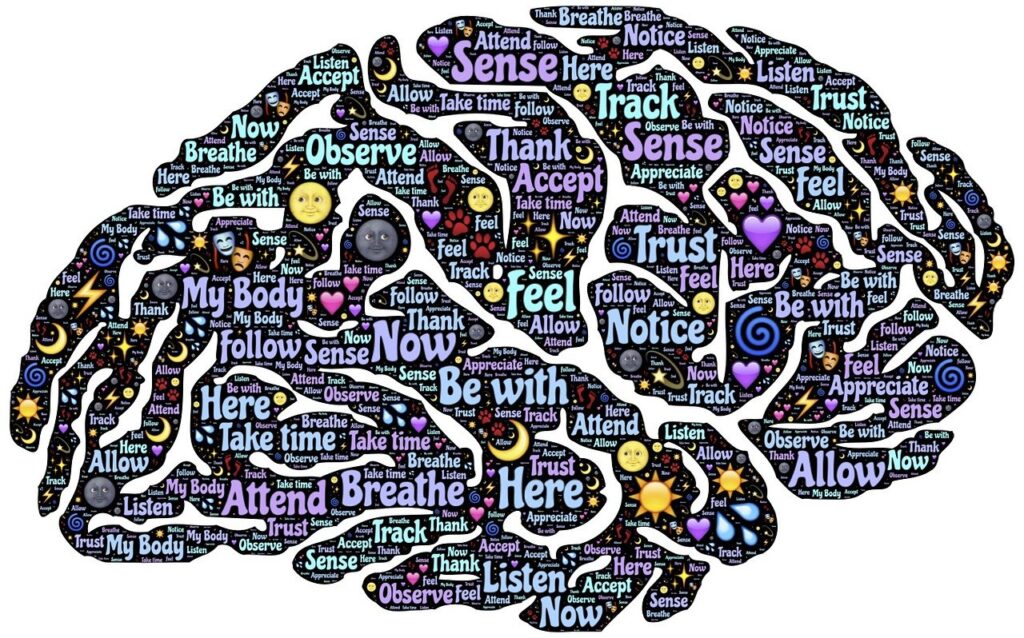With so much conflicting information available, you may have questions with where to even begin. In our Foundations series, we start with the basics and cover topics that are important to your health and wellness. We give you easy to digest information that answers your questions and hopefully leaves you wanting to know more! Today we explore putting POSITIVITY INTO PRACTICE and the benefits this can have on your well-being.

We’ve all been there
- A car cuts you off in traffic, and the rest of the day your heart races and blood boils when you think about it.
- You are headed for a delicious dinner in a few hours, and just imagining it makes your stomach growl and your mouth water.
- That juicy romance novel…well, you get the picture.
Our thoughts are part of a cascade of chemical and electrical signals that trigger our body to react. When we experience an event, whether real or imagined, the same cascade can occur.
In the dinner example above, the thought of your favorite meal, hormones (chemicals) are released in anticipation of the food. Your stomach begins to produce acid for digestion. Your mouth waters to prepare for swallowing. Your hunger hormone, ghrelin, increases. The body is prepping itself for food.

How does this affect my health?
Just as your body prepares for food by releasing hormones to your stomach, the same thing happens when your brain registers other emotions like fear or anger. Or happiness. In the same way that neutral or negative emotions trigger a chemical response in our body, so do positive emotions.
Studies show that simply thinking positive thoughts have a benefit on your level of depression, your blood pressure, levels of pain and overtime your lifespan. Feel good chemicals, like dopamine and serotonin are released, and damaging hormones like cortisol may be lowered.
1. Reduced Stress Levels
- Effect: Positive thinking helps to reduce the body’s production of stress hormones like cortisol.
- Physiological Outcome: Lower blood pressure, reduced muscle tension, and a more relaxed state overall.
2. Improved Immune Function
- Effect: Positive thoughts and emotions can boost the immune system by lowering stress hormones like cortisol.
- Physiological Outcome: Increased production of antibodies and white blood cells, making the body more effective at fighting off infections and diseases.
3. Enhanced Cardiovascular Health
- Effect: Optimistic thinking is linked to better heart health.
- Physiological Outcome: Lower risk of heart disease, lower blood pressure, and reduced heart rate, contributing to a healthier cardiovascular system.
4. Better Pain Management
- Effect: Positive thinking can alter the perception of pain.
- Physiological Outcome: Increased production of endorphins, the body’s natural painkillers, leading to reduced pain sensitivity and better pain tolerance.
5. Improved Digestion
- Effect: A positive mindset can lead to better digestive function.
- Physiological Outcome: Reduced incidence of gastrointestinal issues like indigestion, irritable bowel syndrome (IBS), and ulcers, as stress is a known trigger for these conditions.
6. Improved Mental Health
- Effect: Positive thinking can enhance mental and emotional well-being.
- Physiological Outcome: Reduced levels of anxiety and depression, improved mood, and overall better mental health.
7. Hormonal Balance
- Effect: Positive thoughts can regulate the release of certain hormones.
- Physiological Outcome: Balanced levels of hormones like serotonin and dopamine, which are crucial for mood regulation, as well as reduced levels of cortisol, the stress hormone.
8. Increased Resilience to Stress
- Effect: Positive thinking builds resilience to stress over time.
- Physiological Outcome: The body becomes better at managing stressors, reducing the negative impact of stress on physical health.
9. Better Sleep Quality
- Effect: Positive thinking can promote better sleep patterns.
- Physiological Outcome: Improved sleep quality and duration, which are essential for overall health and recovery.
10. Increased Lifespan
- Effect: Positive thinking is associated with a longer life expectancy.
- Physiological Outcome: Lower rates of mortality from various causes, partly due to the cumulative positive effects on physical health.
What are some ways to think positive?
Practicing positive thinking can significantly enhance your mental and physical well-being. Here are several methods to help cultivate a more positive mindset:

1. Gratitude Practice
- Method: Keep a gratitude journal and write down things you’re thankful for each day. Try one of these for an easy way to get started.
- Benefit: Shifts focus from what’s lacking to what you have, promoting a positive outlook.
2. Positive Affirmations
- Method: Repeat positive statements about yourself and your life daily, such as “I am capable and strong” or “I am surrounded by love and support.”
- Benefit: Reinforces positive beliefs and combats negative self-talk.
3. Visualization
- Method: Spend a few minutes each day visualizing your goals and imagining yourself achieving them. Try this in the morning before you even get out of bed – picture yourself tackling those dreaded tasks or taking steps towards your goals!
- Benefit: Increases motivation and fosters a positive mindset about future possibilities.
4. Mindfulness Meditation
- Method: Practice mindfulness by focusing on the present moment and observing your thoughts without judgment. It sounds cliche, but stop to notice the flowers or the smell of rain in the air. This brief separation from the chatter in your mind does wonders for mental health
- Benefit: Reduces stress, increases self-awareness, and promotes a positive attitude.
5. Surround Yourself with Positivity
- Method: Spend time with positive people, read uplifting books, listen to motivational podcasts, and avoid negative media. Especially avoid media before bed – studies show this can affect your sleep quality which makes staying positive more difficult!
- Benefit: Positive influences can help reinforce your own positive thinking.
6. Focus on Solutions
- Method: When faced with a problem, focus on finding solutions rather than dwelling on the problem itself.
- Benefit: Encourages proactive thinking and reduces feelings of helplessness.
7. Acts of Kindness
- Method: Engage in acts of kindness, such as helping a neighbor, volunteering, or simply offering a smile.
- Benefit: Boosts mood and promotes a sense of connectedness and positivity.
8. Set and Celebrate Goals
- Method: Set achievable goals and celebrate your successes, no matter how small.
- Benefit: Builds a sense of accomplishment and encourages a positive outlook on your abilities and progress.
9. Engage in Hobbies
- Method: Spend time doing activities you enjoy, such as gardening, painting, reading, or playing a sport.
- Benefit: Boosts mood and provides a sense of fulfillment and joy.
10. Healthy Lifestyle Choices
- Method: Engage in regular physical activity, eat a balanced diet, get enough sleep, and practice relaxation techniques.
- Benefit: Physical well-being supports mental well-being, making it easier to maintain a positive mindset.
Incorporating these methods into your daily routine can help cultivate a habit of positive thinking, leading to improved mental health and overall well-being.
Learn More
To learn more about Functional Medicine and see how it may help you, schedule a free 15 minute consultation or head to our Work With Me page! Don’t forget to sign up for our newsletter below as we delve into topics like lifestyle medicine, ingredient highlights, medication concerns and more.
References
- https://www.sciencedirect.com/science/article/pii/S0149763421001470#fig0005
- https://www.anfponline.org/docs/default-source/legacy-docs/docs/ce-articles/nc012024.pdf
- https://www.psychologytoday.com/us/blog/living-forward/202304/how-your-thinking-affects-your-brain-chemistry
- https://sanfordbehavioralhealth.com/2023/08/24/the-health-benefits-of-positive-thinking/
- https://jamesclear.com/positive-thinking
- https://www.mayoclinic.org/healthy-lifestyle/stress-management/in-depth/positive-thinking/art-20043950
